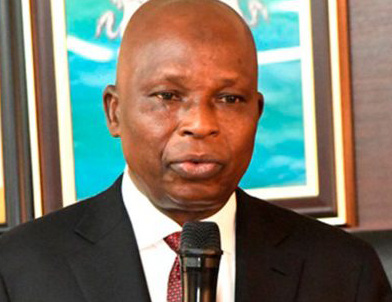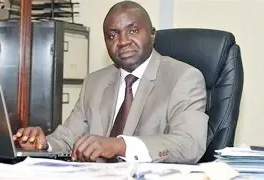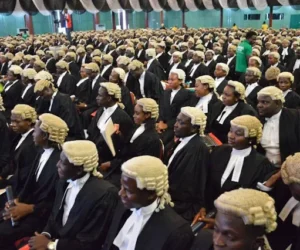1
Five days after a display of arrogance (Do you know who I am?) at the Nnamdi Azikwe International Airport, Abuja by Olórí Akilè of Ijebu-land, Wasiu Ayinde Marshall, widely known as K1 D’ Ultimate – another incident followed at the Muritala Muhammed International Airport, Lagos but this time around, it involved an unknown woman by name of Comfort Emmmason.
Although Comfort, a customer of Ibom Air flight, had a right, as a citizen of Nigeria, to fair hearing; she was not heard but arrested and detained. She or her lawyer wasn’t given the opportunity to state their side of the story. But on the other side, the Fuji icon, the initiator of a rebellious act, walked freely after the unfortunate incident.
K1, a passenger of ValueJet airline, had an obligation to follow airport protocols like other passengers, but declined to cooperate with the ValueJet personnel and the airport security officers. His refusal to obey a simple instruction led to an avoidable altercation which later got out of hand. The argument was so hot the security personnel had to come down from their pedestal to plead with the Fuji icon, an unusual case, to give peace a chance. But instead of yielding to the pleads, he (K1) splashed water/alcohol on the personnel. Not only this, he went further to obstruct the aircraft from flying perhaps to show how influential he was.
The aftermath of both incidents really caught many Nigerians off-guard. And they wondered why K1, whose conduct, in most climes, amounted to terrorism, was treated with kid gloves. Why would a person, who committed a criminal offence that, according to Nigeria’s Criminal Code Act, attracted two-year imprisonment, be allowed to go away scot free while the unknown Comfort was not only molested but also arrested and detained for an offence perceived to be lesser than that of K1?
Section 459A of Nigeria’s Criminal Code Act says: “Any person who, by any unlawful act, obstructs, causes an alteration to be made in the course of, or in any way whatsoever hinders or impedes the movement of any aircraft, which is in motion on or in flight over any aerodrome, is guilty of a misdemeanour and is liable to imprisonment for 2 years.” So why the law was suspended for K1?
Festus Keyamo, a lawyer and human rights activist now the Minister of Aviation, who was cognizant of the gravity of the crime committed, few hours after K1 was sanctioned, withdrew the charges initiated against the popular musician. He did this in the face of the humiliation his action could cause his reputation. What could have propelled an advocate for justice and equality, who was thoroughly trained by the late human rights activist, Gani Fawehimi, to go down so low to reverse the decision earlier made for justice?
And I ask: if Keyamo had not been in government, what would have been his reaction had anyone made the same thoughtless decision he fashioned? Did Keyamo ever care about his integrity anymore? There’s a famous saying that everyone has a price, meaning that everyone can justify a claim, irrespective of how immoral it is, with the right price. We have seen this in many former campaigners of good governance who later became aides of people in government. Without a doubt, Keyamo’s betrayal of integrity, to me, outrightly cemented the popular saying. It’s always funny seeing many Nigerians who crave better society supporting immorality of K1 and celebrating the injustice that followed. Once a person is a friend or an associate of people in power, many Nigerians believe the law should be suspended for the individual. Is this how it works in the country Nigeria strives to look like?
Robert Sylvester Kelly, widely known as R.Kelly, had to face the consequence of the crime he committed despite his influence in the United States. There were other influential personalities around the world who had, one way or the other, faced criminal charges. They weren’t spared to get away with those charges but were served the penalties of the crimes they committed. So why Nigeria should be different?
Bad precedent is undoubtedly hazardous to accommodate. Had K1 faced the outcome of his unruly behaviour and penalised accordingly, the incident that exposed Comfort Emmmason to public humiliation would have been averted. She would have obeyed the cabin attendant who instructed her to switch off her phone and no ‘alteration’ would have ensued. Inasmuch as K1 could disobey ValueJet airline staff without sanction, Comfort’s misbehaviour ought not to have surprised us. After all, “what a man can do, a woman can do better”, they say.
The way the case of Comfort and K1 were handled spoke volumes about the preferential treatments the ‘ogas at the top’ afforded the well-to-do Nigerians. It confirms the usual saying that the Nigerian law is made for only the poor but not for the rich. Isn’t it obvious in this case? K1 was spared for he’s, allegedly, Mr President’s associate; Comfort was detained because she was not a relative of any Nigerian politician.
How do we have a better society in a country where a role model like K1 often find it difficult to follow due process and respect constituted authority? Can Nigeria be better in an environment where ministers, through the federal government, cover up sins of high-profile individuals in the country? What country are we building for the future generations?
K1 was not only pardoned, he was made an ambassador for airport security protocols. This, to me, looked like a skit designed to amuse or entertain Nigerians. What justification is there for rewarding an unruly behaviour that could have led to fatal accident? What exactly is Tinubu’s administration encouraging? The FG has shown us that it’s not necessary to strive to do good before one can be rewarded. It appears that bad behaviours can also earn one an accolade.
Once you have the courage to vandalise public properties repeatedly; terrorise society; disrespect and tarnish the image of the country, inter alia – reward can eventually come your way. If Niger Delta militants and Boko Haram could be given amnesty and rewarded handsomely for holding the entire country hostage, why would anyone blame K1 for holding less than one thousand passengers of ValueJet to ransom?
And the conducts of the airplanes (ValueJet and Ibom Air flight) personnel and that of airport staff are exactly the reflection of who we are in Nigeria. The Ibom Air flight personnel had forgotten that Comfort Emmmason was their customer who ought to be treated like a Queen. They weren’t, at all, aware that Comfort and other passengers were the reason they were employed by the management of the airline.
Where exactly was the place of the slogan, “Customers are always right”, in that regard? Isn’t it morally wrong for a member of staff of a company to shout at a customer, let alone dragging a customer to the extent of exposing her private part to the world? I’m very sure if K1 were common Nigerian like Comfort, the ValueJet personnel would have treated him the same way Ibom Air flight personnel treated the latter.
The impolite way of treating customers is not peculiar to a specific industry, almost all industries in Nigeria are guilty of this. Even in banks where customers’ funds are used for businesses, the way people are treated isn’t different. Banks employees care less about the convenience of bank customers who provide jobs for them. And the ultimate question is: When exactly will the system in Nigeria get rid of this lawlessness?
Babalola writes from Lagos via baba[email protected]







